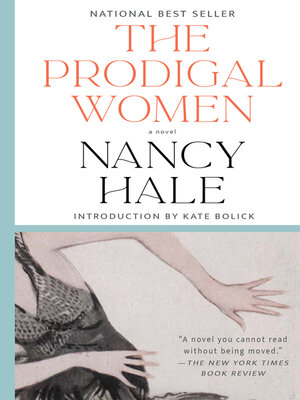
Sign up to save your library
With an OverDrive account, you can save your favorite libraries for at-a-glance information about availability. Find out more about OverDrive accounts.
Find this title in Libby, the library reading app by OverDrive.



Search for a digital library with this title
Title found at these libraries:
| Loading... |
Rediscover the sensational 1942 bestseller that unveiled the Jazz Age as women lived it
As seen in THE NEW YORK TIMES BOOK REVIEW and VANITY FAIR
Set in Boston, New York, and Virginia, The Prodigal Women tells the intertwined stories of three young women who come of age in the Roaring Twenties, not flappers and golden girls but flesh-and-blood female protagonists looking wearily—and warily—at the paths open to women in a rapidly changing world.
Leda March, “frantic with self-consciousness and envy and desire,” is the daughter of poorer relations of a prominent Boston family and an aspiring poet torn between an impulse to conformity and the pursuit of personal freedom. Betsy Jekyll, newly arrived with her family from Virginia, becomes Leda’s closest childhood friend, bringing a beguiling new warmth and openness into the New Englander’s life. But Betsy soon abandons Boston to land a job at a fashion magazine and enjoy life as a single woman in New York before falling in love with—and marrying—an abusive, controlling man. Betsy’s older sister, Maizie, a Southern belle idolized by the two younger friends and pursued by numerous men, grows tired of “running around” and fatefully looks for happiness in marriage to a turbulent artist.
When The Prodigal Women was published in 1942, its uncompromising portrayal of women’s shifting roles, open sexuality, and ambivalence toward motherhood made it a succèss de scandale, spending twenty-three weeks on the New York Times Best Sellers list. Now Library of America restores Nancy Hale’s lost classic to print with a new introduction by Kate Bolick exploring how the novel measures “the gap between what liberation looks like, and what it actually is.”
As seen in THE NEW YORK TIMES BOOK REVIEW and VANITY FAIR
Set in Boston, New York, and Virginia, The Prodigal Women tells the intertwined stories of three young women who come of age in the Roaring Twenties, not flappers and golden girls but flesh-and-blood female protagonists looking wearily—and warily—at the paths open to women in a rapidly changing world.
Leda March, “frantic with self-consciousness and envy and desire,” is the daughter of poorer relations of a prominent Boston family and an aspiring poet torn between an impulse to conformity and the pursuit of personal freedom. Betsy Jekyll, newly arrived with her family from Virginia, becomes Leda’s closest childhood friend, bringing a beguiling new warmth and openness into the New Englander’s life. But Betsy soon abandons Boston to land a job at a fashion magazine and enjoy life as a single woman in New York before falling in love with—and marrying—an abusive, controlling man. Betsy’s older sister, Maizie, a Southern belle idolized by the two younger friends and pursued by numerous men, grows tired of “running around” and fatefully looks for happiness in marriage to a turbulent artist.
When The Prodigal Women was published in 1942, its uncompromising portrayal of women’s shifting roles, open sexuality, and ambivalence toward motherhood made it a succèss de scandale, spending twenty-three weeks on the New York Times Best Sellers list. Now Library of America restores Nancy Hale’s lost classic to print with a new introduction by Kate Bolick exploring how the novel measures “the gap between what liberation looks like, and what it actually is.”






